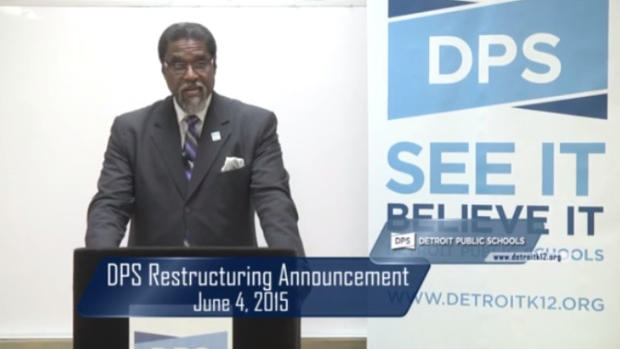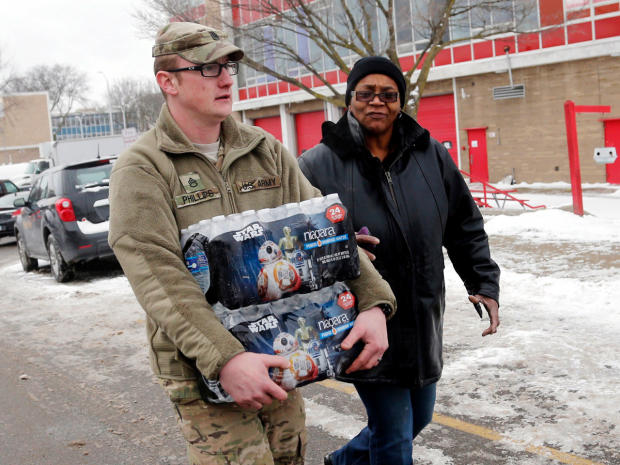Problems in Flint, Detroit show rift over emergency managers
DETROIT -- Darnell Earley didn't come up with the plan to channel corrosive river water into Flint's old lead-lined water pipes, causing a health emergency. And he certainly can't be blamed for the Detroit school system's decaying facilities and wrecked finances, which have prompted teacher boycotts this month.
But the 64-year-old budget expert was in charge of Flint's city government and the Detroit schools at key points in their recent turmoil, and that has made him a focal point of anger about Gov. Rick Snyder's use of "emergency managers" to temporarily run public entities in Michigan that are hopelessly in debt.
Earley, who had a 40-year career in public administration in Michigan, was one of seven outside controllers appointed in the last five years to fix foundering cities or school districts, and he was clearly one of Snyder's go-to guys, getting two of the toughest cases in Flint and the Detroit schools.
In October 2013, he took over control of Flint, a majority black city of 100,000 north of Detroit where more than 40 percent of the population was below the poverty line. He was the third of four managers sent in to cut costs and deal with the city's $13 million deficit.
Earley seemed like a perfect fit for the blue-collar city. He grew up as one of nine children in an African-American family in Muskegon Heights, a small community along Lake Michigan, the son of an auto factory worker and a homemaker. He worked his way through college at Grand Valley State University and earned a master's degree in public administration from Western Michigan University in Kalamazoo.
He also knew Flint. He worked as city administrator in 2001 and served a short stint as Flint's temporary mayor in 2002, as part of a career that also included a stint as city manager in Saginaw.
However, the personal connections didn't defuse the tension in seizing control of all fiscal decisions from locally elected officials.
"They don't listen to nobody," longtime Flint City Councilman Scott Kincaid said of emergency managers. "They don't care about the community. They just care about fixing the finances." Kincaid and others said the managers' tendency to ignore local complaints played a role in the water fiasco, since residents had complained about taste and color of the water.
Whenever Flint City Council members wanted to speak with Earley, they would have to get appointments, said Councilman Wantwaz Davis.
"We couldn't just walk in his office," Davis said. "He's egotistical, very arrogant. Whenever he sets his mind to something, it's going in that direction."
Another emergency manager, Louis Schimmel, who temporarily ran the cities of Hamtramck, Ecorse and Pontiac, defended Earley, saying bruised feelings are unavoidable.
In a city like Flint, he said, "You're dealing with multiple problems and you don't have very much help."
During Earley's 16 months as Flint's emergency manager, the city went ahead with a plan to save money by switching its water supply from the Detroit system to a new pipeline consortium, and to use Flint River water until the new pipeline was ready. However, anti-corrosion agents were not added to the salty river water, causing metal leaching in city pipes and dangerously elevated lead levels among some residents. The state declared an emergency and began distributing bottled water.
Earley declined to speak to The Associated Press, but he defended his work Sunday on WDIV-TV.
"I don't look at it in terms of blame. ... I came along at a time when this project was already underway and it fell to me to oversee implementation of it," he said of using the river. "More facts like that need to be sought out instead of just trying to find someone or something to blame for it."
But some local officials say he shares in the responsibility.
"Darnell and the people in public works and finance in the city believed they could save between $6 million and $8 million. ... And this is what we've got because of that," said Kincaid, who has served on the city council for 30 years.
Snyder praised Earley when he announced his appointment as emergency manager for Detroit's schools a year ago. "Darnell Earley has a track record of success and can guide the district as we work collectively and collaboratively to turnaround the fiscal crisis and ensure a quality education for the city's school children that they need and deserve."
But teachers union officials say he hasn't responded well enough to their complaints about leaky roofs, rodents and mold in school buildings. Snyder has proposed a legislative bailout for the schools. Earley has said he understands teachers' frustrations, but criticized their organized sick-outs.
"He would say 'yeah, yeah,' but he never did anything to diffuse what was going on or showed teachers that he respected them," said Detroit Federation of Teachers President Ivy Bailey.
"You send Mr. Earley from Flint to Detroit. He mismanaged Flint and now he's mismanaged Detroit's schools," Bailey said. "That is horrific."
In addition, on Saturday it was reported that the head of a Flint hospital that found Legionnaires' disease bacteria in its water system more than a year ago said he and experts suspected the Flint River was a likely source of the contaminant.
Don Kooy, president of McLaren hospital, said he was surprised that Michigan and local health agencies didn't inform the public about a Legionnaires' outbreak in Genesee County in 2014-15 until just a few weeks ago.
The outbreak occurred while Flint residents were repeatedly complaining about dirty tap water coming from the river.
"It's a public health issue," Kooy told The Associated Press. "There were people in the city of Flint seeing brown water. It would seem logical that there would have been public reporting or public awareness about the Legionella situation."
At least 87 Legionnaires' cases, including at least nine deaths, were confirmed across Genesee County during a 17-month period.
"Did she die because someone didn't want to say, 'Hey, the water might be bad?' That's my questions," Troy Kidd, whose mother Debbie died of Legionnaires' in August, told CBS News earlier this month.
CBS affiliate WWJ reported the Michigan Department of Health and Human Services said Thursday it cannot conclude that the increase in cases is related to the ongoing Flint water crisis nor can the department rule out an association.
Legionnaires' is a type of pneumonia. The bacteria live in the environment and thrive in warm water. People can get sick if they inhale mist or vapor from contaminated water systems, hot tubs and cooling systems.
Kooy said two cases could have been related to exposure to Legionella bacteria found in the hospital. He said "it's very difficult to know" when a patient is exactly exposed but both patients were successfully treated.
"We were concerned that the city water was the source of it," Kooy said, "but to this day I don't think we could make a definitive statement."
McLaren hospital spent more than $300,000 on a water treatment system and also turned to bottled water for patients.
"The change in (Flint) water quality was a likely factor in causing the increase in Legionnaires' disease" in Genesee County, said Janet Stout, a Pittsburgh microbiologist and Legionella expert who advised the hospital.
In April 2015, Laurel Garrison, a Legionnaires' specialist at the U.S. Centers for Disease Control and Prevention, told state officials by email that the outbreak deserved a "comprehensive investigation."
In an email three months earlier, Jim Collins, the head of Michigan's Communicable Disease Division, said the number of cases at that time "likely represents the tip of the iceberg."
Nonetheless, there was no public announcement at that time.

